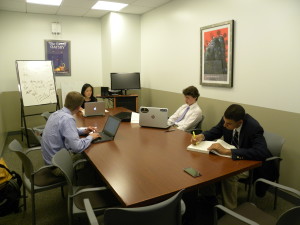Chris Stein ’16: Core classes that take place in library rooms exceed the space and recourses they are offered. Mandarin student Remy Williams ‘15 stated about core classes currently being taught in second floor library prep-rooms, “Even if our class is small, we are still cramped together.” In the past years, more small classes, especially those falling in the Classical Language Department and the World Language Department, have been moved to the rooms in the Annenberg Library originally intended for studying.This year, there are seven core classes.
As rising Upper School enrollment threatens the efficiency of EA’s academic facilities, the smallest classes have been relocated, but many decry the sub-standard facilities, inconvenience, and inequity of the situation.
The first issue enumerated by most students and teachers regarding the facilities is their inadequate size. It is indisputable that the library prep-rooms were intended as study spaces for small groups of students or facilities for collaborative projects. They were never intended to host a class of any kind, especially not one with any more than five students. The majority of each room is taken-up by a large table. This leaves little room for movement, technology, or teaching space.
The largest of the library prep-rooms is intended to seat no more than ten, so the whiteboard is a tight fit in the small room. Williams continued, regarding the whiteboard and technology, “We have just the one T.V. there, and when he [the teacher ] has to write something, he uses a small whiteboard in the corner which is very hard to see.” The facility described is inarguably unsuited for the teaching of a core class at our institution.

Photo Courtesy of Ob Peters ’16
The inconvenience of the situation for students and teachers alike is apparent in the words of Dr. Wei Yang, Mandarin teacher, who says, “If I do not cut class from an early class, it is indeed difficult for me to get to the library class on time. Students sometimes want to ask questions at the end of a class, which makes my time between classes even shorter.” The scenario is not uncommon. Many students complain that their classes in the library make them late to other periods. In addition, the issue of inclement weather is one felt acutely by students taught in library rooms. “It’s really, really bad because if it rains very heavily we have to run across the green to avoid getting too wet,” Williams explained.
Many sources that have requested not to be named have also pointed out the inequity of a situation in which some students are given the facilities of a full classroom while others are taught in the sub-standard conditions of a suffocatingly hot library prep-room. It has been noted repeatedly that the most basic level of the issue is the problem of equality. Many students that take classes in these library rooms feel regarding the issue that they are at a disadvantage while other students have access to more facilities and a better learning environment.
Beyond the inefficacy of the prep-rooms to fill the role of a classroom and the inconvenience they are to students and faculty, the rooms are not being used for their intended purpose. On the issue, Jennifer Phiambolis, Librarian, has stated, “Sometimes, when the rooms are being used for classes, kids come to use them to study, but they are already occupied, and we have to turn them away.” Especially as exam time approaches, it is truly unfortunate that many rooms will not be used, except for classes, because the prep-rooms are a valuable commodity as a locale for collaborative studying.
Amidst rumblings of movements towards converting the library computer lab to a classroom, students, faculty, and parents should be wary of the changes to Episcopal’s dynamic learning environment as it seemingly shifts its focus away from some students in less popular disciplines.
“It’s like any other classroom,” Williams reiterated regarding the prep-rooms, “but a little bit worse.” In order to retain a rigorous and high-level academic environment, it is necessary for the administration to reconsider the classes currently being taught in the library prep-rooms, for they are not only inconvenient and ineffective but also inequitable. It is clear that a more careful look at scheduling is needed to prevent this issue in future years. Yang, who teaches multiple classes in the rooms finished by stressing strongly that, “The library research rooms are not designed for classroom teaching and should not be used for such purposes.”